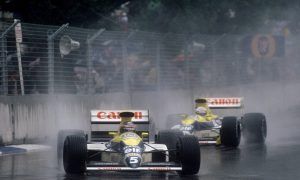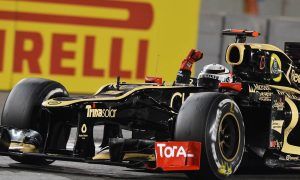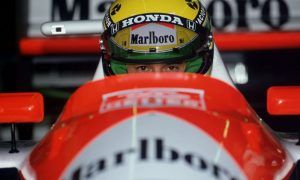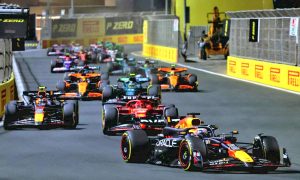
©CahierArchive
You also drove in Formula Nippon and IndyCar…
I fell out with Formula 1, or Formula 1 fell out with me at the end of ’89, so I had an offer to go racing in DTM with BMW to be their Number 1 driver, but Akira Akagi (owner of Leyton House) asked me to go and race in Japan. He was a nice man, a super nice gangster. He asked me if I’d be prepared to create a Formula 1 team with him, as he wanted to be the first person in the world who had two Formula 1 teams, as he had the Leyton House Racing, with Adrian (Newey), Maurizio (Gugelmin) and Ivan (Capelli) and he wanted to have one with some Japanese involvement. So I did the entire Formula Nippon series with him (maybe it was still called F3000) and I did the Mugen-Honda 3.5 litre engine test programme and the initial Bridgestone testing, pre-Formula 1. That was with the Reynard Formula 1 car, with Malcolm Oastler as the chief designer it was a kind of hybrid between a 3000 and a Formula 1 car and it’s in the Honda museum now. That’s how I ended up in Japan. As for IndyCar, when I was really unemployed as a racing driver, my girlfriend said why don't we go to America and I replied that I didn’t want to. But we did and I went to Long Beach…
Do you do everything your girlfriends tell you? Earrings, horses, trips to the States…
It’s good to have someone to listen to, because once you are in a high pressure environment, you have to take your own decisions all the bloody time and sometimes you don't see things as you are so focused on how you are going to deal with this or that problem. So it’s good to have an influence that broadens your horizons and I learned to live with that although it’s not my character – I know what I’m doing. Anyway, I went to the States, had a look round in the paddock and ran into Andreas Leberling who was my chief mechanic at Zakspeed and he was the crew chief at a small Indy team called Euro Motor Sport. He asked me to drive the car for a test once the Indy 500 was over and done with. Their driver, Jovy Marcelo got killed in Indy qualifying and he called me and said it's very sad but we need a driver and that’s how I ended up in Indy.

The final question: Here in Germany there is so much uncertainty about the race’s future, we haven’t seen the old-style crowds and yet Germany is the dominant force on track, with Mercedes and four drivers on the grid, including multiple world champion Sebastian Vettel. What’s the missing spark, what did Michael Schumacher have that isn’t there now?
There is no such thing in Germany as understanding what racing actually is. There is no understanding of a racing spirit. I can tell you this is the case because I had to learn it when I moved to England in the early Eighties. I got it, I learned it and it’s in my blood and I’m totally infected by it. What I mean by racing spirit is the urge to be faster than anybody else out there and it's a pleasure to actually go faster for the people involved, the lads in the garage it’s a competitive spirit to actually beat the other guys by being better. The most fiercely competitive people on planet Earth are race mechanics.
The Germans however never learned it, because it’s a very British thing because the British used to go racing with everything from boats to horses, dating way back and it is a tradition. Racing was phenomenally normal because there was all sorts of racing going on, but it was very different in my country.
Pre-war, motor racing was seen as a marketing tool for the government to prove that the Germans were better engineers than the rest of the world. After the war, it kind of died down to nothing and eventually ended up being a freak sport for lunatics and when I was racing in Formula 1, I was the only German on the grid. The state owned TV channels declared that Formula 1 was bad for the public and wouldn’t show it. There was no understanding of the sport and it was only Michael who initiated an incredible boom.
However, the sad thing was or is, that none of those Michael fans were Formula 1 fans, they were Michael fans. I could see that clearly because if you are sitting up in the grandstand in Hockenheim and you are watching Michael go by and they all roar and then Damon spins and they all clap and cheer; they are not racing people because they don’t understand that it takes all the drivers to make the sport. Only a very small number of Germans have twigged that and that’s the reason why the Michael days were Michael days and not Formula 1 days. Now we have established a good (TV) viewership of about five million people per grand prix which is very good, but it’s nowhere near the figures for the Bundesliga.
REPORT: Impressive Rosberg takes pole for the German Grand Prix
LIVE: German Grand Prix weekend
Silbermann says ... Backing the wrong horse
Exclusive Alex Wurz Q&A: GPDA chairman "surprised" by Halo delay
Keep up to date with all the F1 news via Facebook and Twitter







